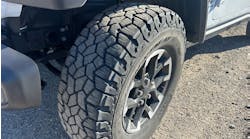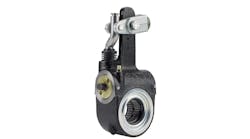Lousiana tire shop's wheel-off avoidance strategy: zero tolerance
Wheel-offs happen “on average about three times a day somewhere here in North America,” Rod Imhoff, key account manager at Chicago Pneumatic, recently told Fleet Maintenance.
Spec'ing the right equipment and using the proper tools goes a long way to mitigating these potentially fatal accidents. One auto shop that has reigned in wheel-offs found another successful preventive method: Severe conseqences.
Twenty years ago, a customer left Chabill’s Tire & Auto Service and had a wheel come off of the vehicle. Luckily no one on the road was injured, but it really bothered co-founder Charles "Charley" L. Gowland, Sr. and he vowed that it would never happen again.
Essentially, anyone involved in working on or quality-checking a wheel-end that then comes off also hits the road.
“Mr. Charley always felt like the one thing we did that he lost sleep over at night was putting wheels back on, because it’s so simple, but it can lead to somebody getting hurt," recalled Carey Barron, director of operations, of the late tire entrepreneur.
And management took the shop mistake seriously, calling in the Louisiana repair company's store managers into a meeting after the incident. They were locked in the board room and told to come up with a solution and consequences for anyone who didn’t follow the new policy.
The managers later emerged with a policy that stands today, which the shop refers to as "double torque."
When a wheel is installed, a torque limiter is used and is run up to 55 lbs. After that, every lug nut is hand-tightened by a technician while another person—usually the store manager or service advisor—watches. That observer then has to sign off on the work order that it was done according to the process. (Only in rare cases where a store is short-staffed can a second technician serve as the witness. But even then, that technician has to sign the work order.)
“The consequences are, if a wheel comes off and that policy was not followed, both people lose their jobs immediately,” Barron said.
It’s been five years since that happened, and the company stayed true to its set consequences. It cost the jobs of a technician and a manager who had worked for the company for a dozen years.
“That’s a non-negotiable,” Barron said said.
And there are others, like the expectation that employees arrive at work on time.
“It’s been a big issue, especially with younger people,” Barron noted. “I think while it’s a non-negotiable for most of us, some of the managers would rather have a bad employee than no employee, and they don’t understand how that affects the dynamic for everybody.”
He’s sent two members of his immediate family home unpaid because they couldn’t get to work on time.
“We work hard for the image that we have, (and) for people to understand that we’re trying to do the right things for the right reasons," he explained. "The easiest job we give anybody that works here is to get to work on time.”
These non-negotiables are in place with the hope of keeping every location, and every employee, on the same page. He wants store managers to make these expectations clear whenever a new employee joins the team.
“This is what I expect from you. This is the standard you’re going to be held to. Then, when you have to have the conversation (about a problem), it’s not a surprise.”
This article was originally published on ModernTireDealer.Com



